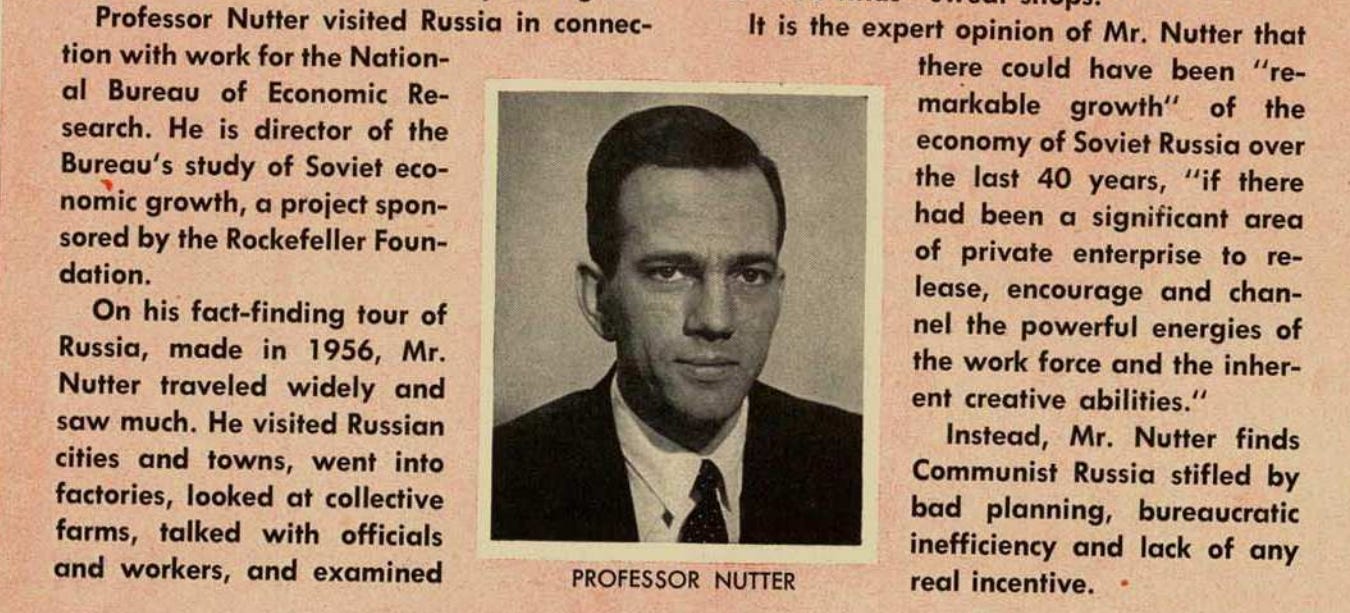Nutter Russia
Warren Nutter (1923-1979) was a prescient detractor of the Soviet economy. Only today, though, did I learn (through my colleague David Levy) that Nutter actually toured the USSR in 1956 – and shared his observations in U.S. News and World Report. Two highlights:
Industrial expositions are dominated by displays of machinery, mostly of the “heavy” variety.
All this in an economy that apparently has not yet discovered the wheelbarrow – sledges and two-man litters are used instead – where the scythe is far more in evidence than the mower, where brooms are mostly bundles of twigs without handles, where the mop is a handless rag, etc. In the drive for modernism, the Soviet system has apparently ignored the multitude of simple yet dramatic inventions so important in the economic development of other countries.
Nutter’s punchline:
I must confess that I am more mystified than ever about how the Soviet economy can have achieved all that its leaders claim for it. It puts a heavy strain on my imagination to picture one large isolated sector of the economy – namely, heavy industry – where all these signs of backwardness vanish, and industrial progress rivaling or exceeding that of the West reigns.
The article appeared on March 1, 1957. David Levy speculated that a single dramatic event later that year discredited Nutter in his peer’s eyes. The event was Sputnik. But if that’s the real story, Nutter’s peers were victims of availability bias. Sputnik didn’t prove the existence of “one large isolated sector” where the Soviets “rivaled or exceeded” the West. It confirmed what every informed observer of the Soviet Union should have already known: The Politburo’s willingness to pour massive resources into economically insignificant prestige projects to dazzle the gullible.
P.S. Thanks to Gwern, Nutter’s original article is finally online. Here’s the highlight from a 1957 Communist rebuttal:
This year the Soviet people celebrate a splendid date-the 40th anniversary of the October Socialist Revolution. They will mark this genuinely nation-wide festival with remarkable achievements. In the course of these 40 years, of which no fewer than 18 were occupied with the Civil War, the Second World War and the subsequent rehabilitation of the economy, the onetime backward agrarian country has been transformed, on the basis of socialism, into a mighty industrial power. The great leap made by our country from the position of a backward country to that of a leading Power is convincing proof of the superiority of the socialist system…
That is why the ideologues of capitalism, as if acting according to command, are flooding the market with articles and books lauding capitalism and sneering at socialism…
As a typical example we can take an article by Professor Warren Nutter, which appeared in U.S. News & World Report.1 The very title of the article (“The True Story of Russia’s Weakness”), its hostile, anti-Soviet tone, its shrillness, and the tendentious presentation-all betray the wishful thinking of its author and his paymasters: to see the U.S.S.R. weak. Without concealing their hatred for the Soviet Union, they try to confuse and deceive their readers, to conceal from them the real truth about its genuine strength
and might.
The post appeared first on Econlib.



A friend of my family was on an "official" agriculture visit to the USSR in the early or mid-70s. He grew up on a prosperous farm and really knew actual farming.
He reported seeing 1890s style harvesting while shiny new combines sat in a row, unused. He managed to sidle up to them. They were all missing the drive shaft. They had been shipped to the collective farm without them.
He went back later. Said he was taking one suitcase with clothes and one full of Marlboros and toilet paper.
You should check out Robert Heinlein's essay, Pravda Means Truth. He also visited the USSR in the 1950s and came back to personally fund anti-disarmament ads. His wife learned Russian before their trip so they could talk to people without interpreters! In looking for a link to it, I came across a link to the Heinlein Archives where there is correspondence with the editor about the essay. https://www.heinleinarchive.org/product-page/opus-137-pravda-means-truth The essay appeared in American Mercury in Oct 1960 and in a longer version in the much later collection Expanded Universe (where I read it).